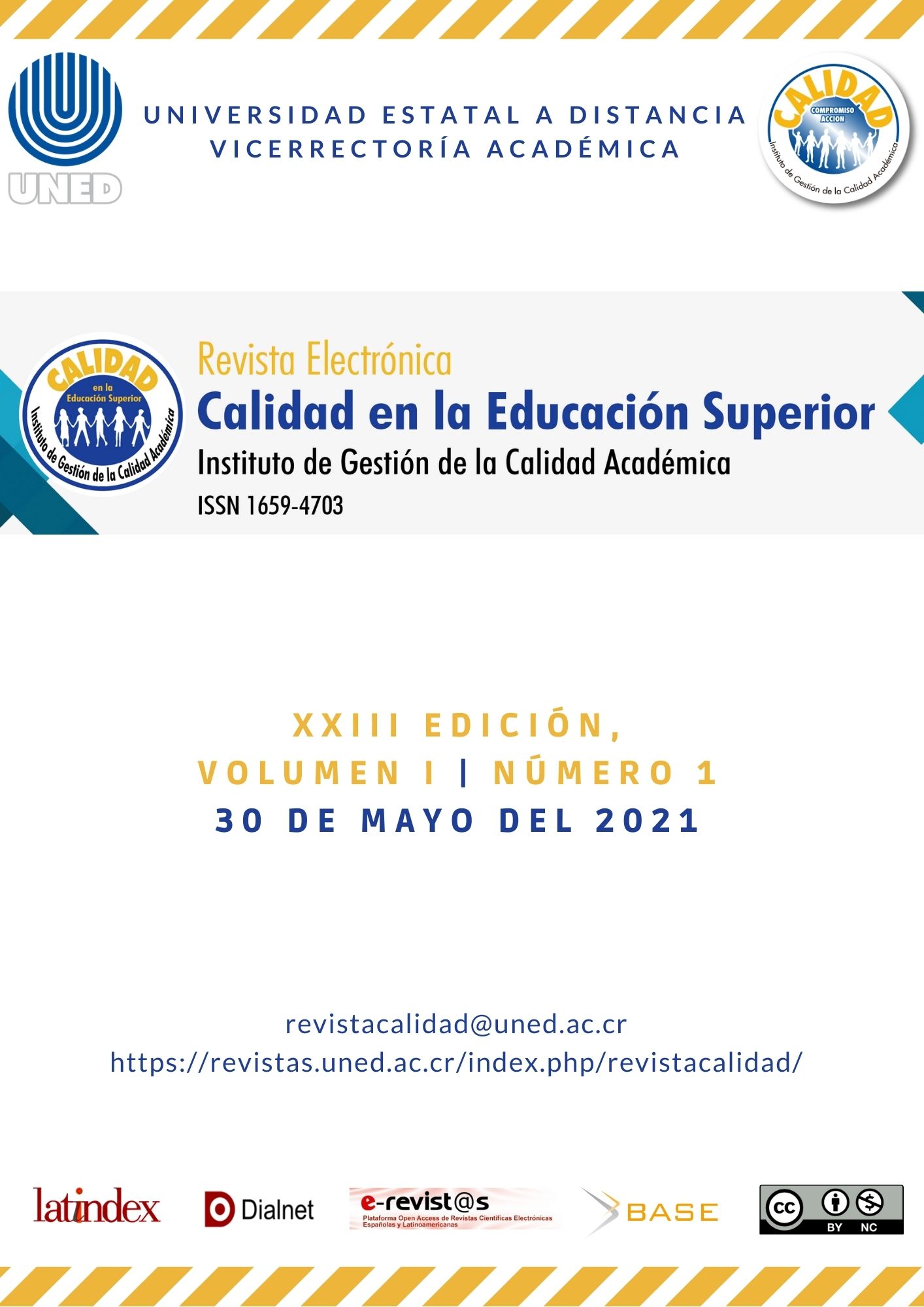¿Cómo propiciar las habilidades no técnicas en carreras de ingeniería? Enfoques para la investigación
DOI:
https://doi.org/10.22458/caes.v12i1.3409Palabras clave:
habilidades no técnicas, habilidades blandas, habilidades gerenciales, competencias genéricas, competencias transferibles, ingenieríaResumen
En este ensayo se desarrolla una guía de investigación para el tema de habilidades no técnicas en ingeniería. Se caracterizan tres líneas de investigación que cuentan con distintos enfoques teóricos y metodológicos, a saber: la definición de cuáles habilidades blandas se debe desarrollar, la identificación de brechas entre las competencias desarrolladas por la universidad con respecto a las demandadas por los entes empleadores y la determinación de las formas de integrar las habilidades blandas en el proceso de enseñanza-aprendizaje. Dicha caracterización se realiza partir de evidencias empíricas de estudios desarrollados en Estados Unidos, España, Alemania, Rumania, Croacia, India, El Líbano, Malasia e Indonesia.
Citas
Atkinson, H., & Pennington, M. (2012). Unemployment of engineering graduates: the key issues. Engineering education, 7(2), 7-15. https://doi.org/10.11120/ened.2012.07020007
Coetzee, M. (2014). Measuring student graduateness: Reliability and construct validity of the Graduate Skills and Attributes Scale. Higher Education Research & Development, 33(5), 887-902. https://doi.org/10.1080/07294360.2014.890572
de la Harpe, B., & David, C. (2012). Major influences on the teaching and assessment of graduate attributes. Higher Education Research & Development, 31(4), 493-510. https://doi.org/10.1080/07294360.2011.629361
Gibbings, P., Lidstone, J., & Bruce, C. (2010). How do student attributes influence the way students experience problem-based learning in virtual space? Australasian Journal of Engineering Education, 16(1), 69-80. https://doi.org/10.1080/22054952.2010.11464036
Hernández-Pina, F., y Monroy, F. (2015). A preliminary study of teachers’ perception of core competencies for undergraduate students. Psicología Educativa, 21(1), 11-16. https://doi.org/10.1016/j.pse.2015.02.001
Idrus, H. (2014, October). Developing well-rounded graduates through integration of soft skills in the teaching of engineering courses. En Frontiers in Education Conference (FIE), 2014 IEEE (pp. 1-9). IEEE. 10.1109/FIE.2014.7044123.
Leung, M. Y., Chen, D., & Chan, I. Y. S. (2011). Attributes of Hong Kong construction engineering student learning approaches: Investigation of Chinese and western personal values. Journal of Professional Issues in Engineering Education and Practice, 138(3), 224-233. doi: 10.1061/(ASCE)EI.1943-5541.0000103.
Mekovec, R., Aničić, K. P., y Arbanas, K. (2018). Developing undergraduate IT students’ generic competencies through problem-based learning. TEM JOURNAL-Technology, Education, Management, Informatics, 7(1), 193-200.
Nayak, G. (2014). The Effect of a Soft Skills Training Program on the Group Discussion Skills of Engineering Students. IUP Journal of Soft Skills, 8(3), 66.
Parasuraman, J., y Prasad, N. H. (2015). Acquisition of corporate employability skills: A study with reference to engineering graduates. IUP Journal of Soft Skills, 9(2), 22.
Programa Estado de la Nación en Desarrollo Humano Sostenible (2014). Estado de la Ciencia, la Tecnología y la Innovación. EDISA S.A.
Sankar, C. S., Kawulich, B., Clayton, H., y Raju, P. K. (2010). Developing leadership skills in introduction to engineering courses through multi-media case studies. Journal of STEM Education: Innovations and Research, 11(3).
Stawiski, S., Germuth, A., Yarborough, P., Alford, V., y Parrish, L. (2017). Infusing Twenty-First-Century Skills into Engineering Education. Journal of business and psychology, 32(3), 335-346. https://doi.org/10.1007/s10869-016-9477-2
Sukamto, S., y Effendi, Z. M. (2016). Developing a model of soft-skill teaching for civil engineering students. REiD (Research and Evaluation in Education), 2(2), 122-134. https://doi.org/10.21831/reid.v2i2.8220
Thurner, V., Böttcher, A., y Winter, V. (2012). Soft Skill Development along the Education Path. International Journal of Engineering Pedagogy, 2(3). http://dx.doi.org/10.3991/ijep.v2i3.2148
Vyas, P., y Chauhan, G. S. (2015). Soft Skills: A Panacea for Enhancing Engineering Graduates' Employability in IT Industry. IUP Journal of Soft Skills, 9(4), 50.
Yaacoub, H. K., Husseini, F., y Choueiki, Z. (2011, January). Engineering soft skills: a comparative study between the GCC area demands and the ABET requirements. In Competition Forum (Vol. 9, No. 1, p. 88). American Society for Competitiv
Publicado
Cómo citar
Número
Sección
Licencia
Esta revista provee acceso libre inmediato a su contenido bajo el principio de que hacer disponible gratuitamente la investigación al publico, lo cual fomenta un mayor intercambio de conocimiento global.



